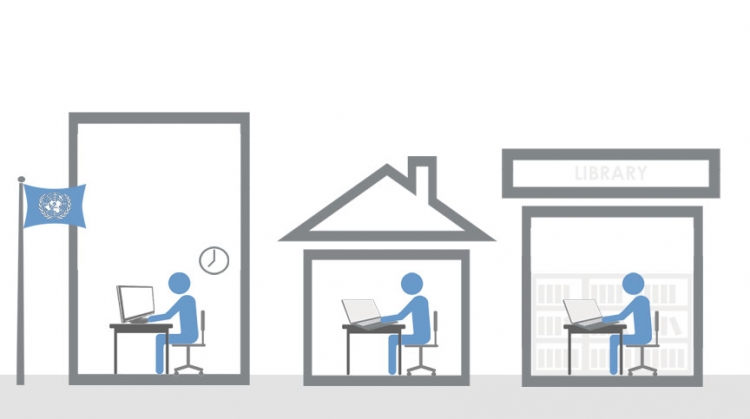
For over a decade, the United Nations Secretariat has been offering different options for Flexible Working Arrangements (FWAs) as part of its efforts to support better work life balance for staff. With advances in technology and more familiarity with the four different flexible working options available, the number of staff taking advantage of flexible working arrangements in 2015 rose by 30% as compared to 2014.
For the last two years, the most popular FWA option has been ‘staggered working hours’. This option allows staff, with their manager’s approval, to adjust the start and end of their day, provided they work the required number of working hours (including core hours) set by their duty station, thereby facilitating, for example, that parents can drop off or pick up their kids from school more easily.
Almost as popular has been telecommuting, or the option of travelling to work electronically. This option has grown significantly in 2015, due in part to improved investments in technology by the Organization making it much easier for staff to work remotely. OICT, for instance, has centralized platforms for content management and collaboration (e.g. Unite Connections and Unite Docs), as well as modern tools to support mobile email, global instant chat, virtual meetings and conferences, search across multiple sources, external access to iSeek, and much more. Umoja as well empowers staff to carry out administrative processes remotely which, traditionally, could only be performed within the UN network, enabling colleagues across the globe to conduct businesses beyond the confines of their desks. Flexible Workplace also enables telecommuting as the project replaces desktop computers with laptops. Staff in Flexible Workplace have the technology to work in a place of their choosing, either in their assigned area or to telecommute.
While there is no automatic right or entitlement to flexible working arrangements, FWAs provide opportunities for staff and managers to reorganize time spent in the office while still ensuring that their work is done effectively. The move towards more flexible arrangements within an office requires a change in our culture, an open conversation between managers and their staff, and careful planning and preparation. Its success depends on the suitability of the job for flexible work and the commitment of both parties to make it work. And when it works, it can lead to more engaged and motivated employees and result in more harmonious and balanced workplace.
For more information, please visit the FWA page on the HR Portal where you can also find the 2015 FWA Utilization Report.
For Unite Services, please visit the OICT page.
To learn more about Flexible Workplace, please go to https://flexibleworkplace.un.org/
